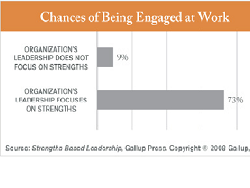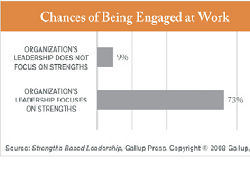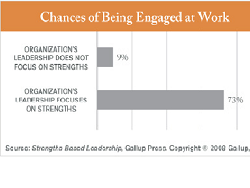


The “vision thing” pales in comparison to instilling trust, compassion, stability, and hope
A Gallup Management Journal Q&A with Tom Rath and Barry Conchie, authors of Strengths Based Leadership
According to Tom Rath and Barry Conchie, coauthors of Strengths Based Leadership: Great Leaders, Teams, and Why People Follow, it's easy for leaders to misunderstand what followers need. The confusion is exacerbated because what leaders get paid to do often is not what their followers need them to do.
To run an organization effectively, leaders must be able to strategize, set visions and priorities, build relationships, influence others, and make things happen. But if you ask followers what they need from leaders, the clear answer is trust, compassion, stability, and hope. These four basic needs are the result of Rath, Conchie, and a Gallup research team asking more than 10,000 followers what the most influential leaders contribute to their lives.
In this interview, Rath and Conchie discuss followers' four basic needs and why it is important for leaders to understand and meet those needs -- and the challenges leaders face in meeting them. They explain how leaders' emotional reactions can skew how they respond to challenges and why it's riskier to avoid forming personal relationships with subordinates than not to.
GMJ: Your book says that followers have four basic needs, one of which is trust. How do leaders build trust, and why is it so important?
Tom Rath: I think trust is primarily built through relationships, and it's important because it's the foundational currency that a leader has with his team or his followers.
Barry Conchie: A baseline level of trust exists at the transactional level when people see leaders doing what they say they will do. But real trust is actually much more complicated than that. Trust also speaks to behavioral predictability. It's hard to trust a volatile leader in times of change.
GMJ: Then how do leaders provide stability -- another of the four things followers need -- especially in volatile economic times like these?
Rath: If there was ever a time when stability was important, it's right now. At a very basic level, people need to know that there is constancy in their jobs and, more broadly, in where the organization is headed. They need to believe that they'll have a job several months down the road and that their company will be better off a year from now than it is right now. It's just hard to get your work done on a day-to-day basis if you have real insecurity about where your organization is headed.
Leaders need to be thinking constantly about what they're doing to create a basic sense of security and stability throughout an organization. The minute that starts to erode, the organization can go downhill pretty quickly, as you see in many cases right now.
GMJ: It seems that stability and hope are linked. What's the effect of hope on followers?
Rath: That's one of the things that poses a real challenge for leaders. They've got to find the right balance of providing stability in the moment while giving followers hope and inspiration for the future. Followers need to see how things will get better and what that future might look like. Leaders need to build that foundation of stability, and hope sits on top of that. I'm not sure if it's possible to create hope without starting with stability at the base.
Conchie: Hope creates an aspirational factor among all the things that you're trying to do in your organization, and it gives people a reason to commit. Hope suggests that the future will be better than the present, and that what we're doing as an organization now will contribute toward creating that future.
Now, you can't build hope without trust. You can't build hope without stability. But trust and stability aren't enough. You do need hope to draw people toward a better future and give them aspirations. And it's a critical aspect of leadership right now.
GMJ: Many people don't feel much affinity for their bosses, do they?
Tom Rath: On average, spending time with your boss is consistently rated as the least pleasurable activity in a given day. When you ask people about what they enjoy doing, time spent with the boss is even worse than time spent cleaning the house. So this suggests that there are a lot of leaders out there who are not doing an adequate job.
But in organizations with leadership that focuses on the strengths of their employees, the odds of people being engaged go up about eightfold, according to our research. So it's important that leaders focus on employee strengths because maybe the most critical part of their job is helping others uncover their strengths. That's not occurring as much as it should, and it's creating quite a bit of disengagement.
GMJ: Of the thirty-four talent themes that the Clifton StrengthsFinder assessment identifies, which are the most common among great leaders?
Barry Conchie: I've got a problem with the question.
GMJ: Why?
Conchie: There is no single characteristic or set of characteristics that would enable us to determine an effective leader. The most effective leaders are the ones who figure out how best to use what they've got. So it matters less what the strengths are in terms of the themes; what's key is that the leaders understand the strengths they have, how those strengths help them to be effective, and that they use strategies and methods to deploy their strengths to the greatest effect.
Rath: I think that from all the research that Gallup's done on leadership over the last three or four decades, the broadest discovery is that there is no universal set of talents that all leaders have in common. As we looked through these data and ran through hundreds of transcripts and individual interviews, we were struck by just how different all these leaders are.
If you were to sit down with each of the four leaders we featured in the book [Brad Anderson, vice chairman and CEO of Best Buy; Wendy Kopp, CEO and founder of Teach For America; Simon Cooper, president and CEO, The Ritz-Carlton Hotel Company, LLC; and Mervyn Davies, chairman, Standard Chartered Bank], you'd notice that they do things very differently based on their strong awareness of their unique talents.
Adapted from the Gallup Management Journal. Copyright ©2009 Gallup. All rights reserved. Reprinted with permission.
Don't miss out on updates and chances
to sharpen your skills with participant-centered learning.




3740 N Chestnut St #113 - Chaska, MN 55318-3053